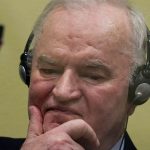Israel’s president has called on Prime Minister Benjamin Netanyahu to “stop the legislative process immediately” after the PM triggered widespread protests by sacking his defence minister for objecting to judicial reforms.
President Isaac Herzog, the head of state who is supposed to remain above politics, said “the eyes of the whole world are on you” following Mr Netanyahu‘s dismissal of Yoav Gallant on Sunday.
Mr Gallant broke ranks as an increasing number of Israeli Defence Force reservists have been going on strike in protest at the government’s proposals.
The proposals would see ministers hold more control over the appointments of judges, including in the Supreme Court, while diminishing that body’s ability to veto legislation or rule against the government.
Tens of thousands of protesters turned out on Sunday night, blocking Tel Aviv’s main highway and breaking barricades near Mr Netanyahu’s home in Jerusalem.
Demonstrations also took place in Beersheba and Haifa.
Mr Herzog said: “I am addressing the prime minister, the members of the government and the companies and members of the coalition: the feelings are difficult and painful. Deep concern surrounds the entire nation.
“Security, the economy, society – all are threatened. The eyes of all the people of Israel are on you. The eyes of the entire Jewish people are on you. The eyes of the whole world are on you.
“For the sake of the unity of the people of Israel, for the sake of the responsibility, I call on you to stop the legislative process immediately.
“I appeal to the heads of all Knesset factions, coalition and opposition alike, to put the citizens of the country above all else, and to act responsibly and courageously without further delay.
“Come to your senses now! This is not a political moment, this is a moment for leadership and responsibility.”
In a statement on Sunday night, White House National Security Council spokeswoman Adrienne Watson had said: “We continue to strongly urge Israeli leaders to find a compromise as soon as possible. We believe that is the best path forward for Israel and all of its citizens.
“As the president (Joe Biden) recently discussed with Prime Minister Netanyahu, democratic values have always been, and must remain, a hallmark of the US-Israel relationship.
“Democratic societies are strengthened by checks and balances, and fundamental changes to a democratic system should be pursued with the broadest possible base of popular support.”
People have taken to the streets over the past 13 weeks to protest against the judicial plan in the largest demonstrations in the country’s 75-year history.
One of those demonstrating on Sunday told Sky’s Alistair Bunkall that the proposed overhaul of the judiciary was “damaging the country […] and the unity of the country”.
“I’m really scared for the future of this country,” he said.
Read more:
Is Israel’s democracy on the brink?
Protests are set to continue this week as the right-wing and staunchly conservative government moves to push its proposals through the Knesset, its legislature, with universities announcing a general strike for Monday.
Israel’s police chief said officers would not allow public disturbances and damage to symbols of government.
Netanyahu ‘a threat to security’
Hours after the announcement that Mr Gallant had been fired, Israel’s consul general in New York, Asaf Zamir, quit.
He said it was time for him “to join the fight for Israel’s future”.
Opposition leader Yair Lapid tweeted that Mr Netanyahu had become “a threat to the security of the state of Israel”.
Mr Gallant had called for a pause in the legislation until after next month’s Independence Day holidays, citing a threat to Israel’s national security.
On Saturday, he said: “I declare loudly and publicly, for the sake of Israel’s security, for the sake of our sons and daughters, the legislative process should be stopped.
“The victory of a single side, whether it be in the halls of the Knesset [Israeli parliament], or on the streets of our cities, will lead to a loss for the state of Israel.”
Mr Netanyahu’s office did not provide further details, but his public diplomacy minister said Mr Gallant was told of his sacking after being summoned to the PM’s office.
He was told Mr Netanyahu “doesn’t have any faith in him any more, and therefore he is fired”.
Be the first to get Breaking News
Install the Sky News app for free
Read more:
Defence minister breaking ranks is significant moment
In a statement after his sacking, Mr Gallant said: “The security of the state of Israel has always been and will always remain the mission of my life.”
A replacement for him has not been announced.
Middle East correspondent
This dramatic move isn’t without its risks.
Mr Gallant wasn’t the only one to voice concerns about the protests gripping Israel.
Other senior figures in Israel’s security establishment, including the IDF chief of staff and head of the internal intelligence agency, Shin Bet, have also warned of the corrosive effect the reforms are having on Israel’s security.
Hundreds of Israeli military reservists have gone on strike in protest, threatening the military’s operational capabilities.
By firing Mr Gallant, Mr Netanyahu is effectively siding with the far-right voices in his coalition over the people entrusted with Israel’s security.
The previous defence minister, Benny Gantz, has accused Mr Netanyahu of putting “politics and himself above security”.
The main opposition leader and former prime minister Yair Lapid has described it as “an act of madness, indicating a complete lack of judgement”.
Mr Gallant said he had tried to raise his concerns in private and had asked for cabinet meetings to talk about a different way forward.
His calls were ignored, and he has now been punished for airing his views in public.
The security situation in the West Bank is as fragile as it has been for decades.
Talk of a Third Intifada (uprising) has been increasing and the holy Muslim month of Ramadan, just a few days old, is being seen as a crucial moment.
Removing the defence minister, at this point in time, is a big call.
Mr Gallant was supported by three other politicians from Mr Netanyahu’s party when he spoke out last night.
His firing might harden those views and threaten Mr Netanyahu’s majority of four in the Knesset. If other politicians are harbouring private doubts, they too might now feel forced to speak out.
Neither side is backing down. The national demonstrations are growing in size, almost by the day now, and Mr Netanyahu has said he will continue to drive through reforms at the pace before the Passover recess.
Right now, it’s hard to see any good solution to Israel’s crisis.






















